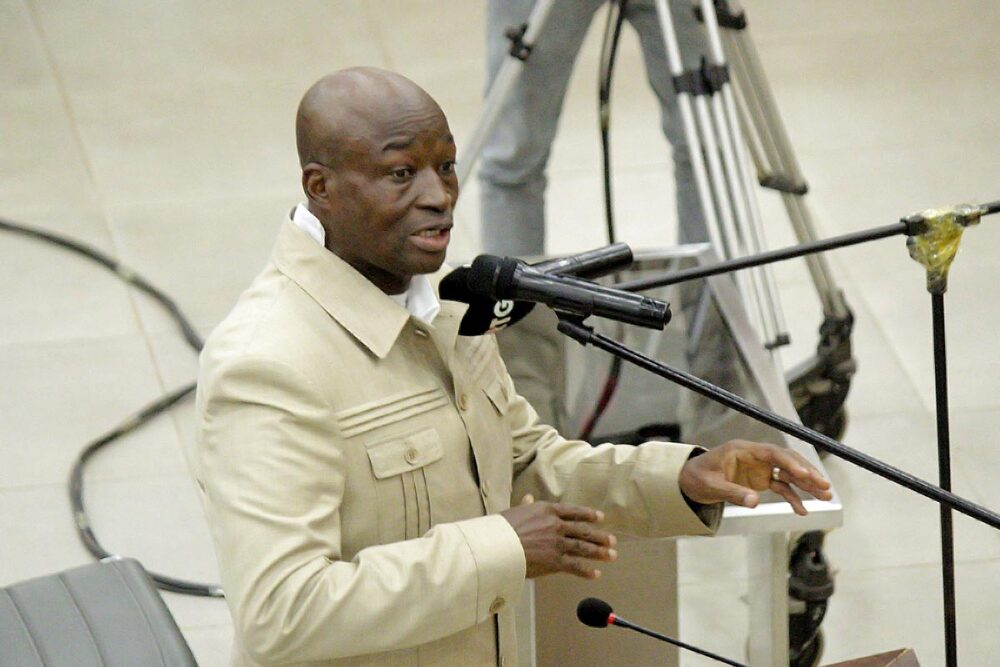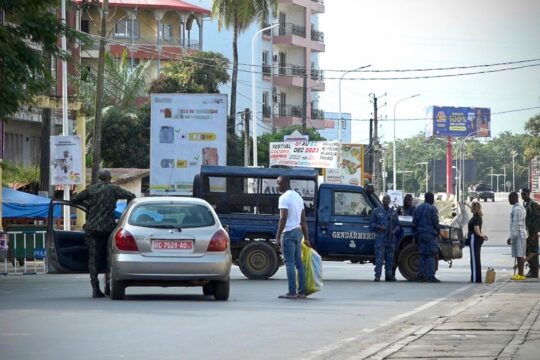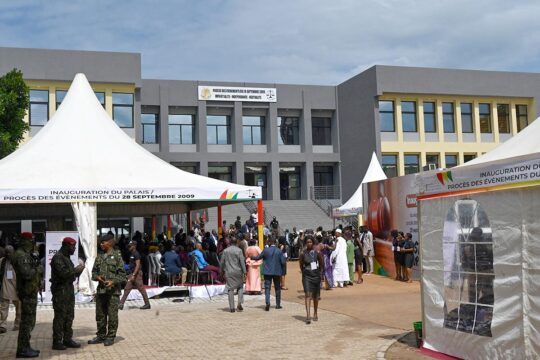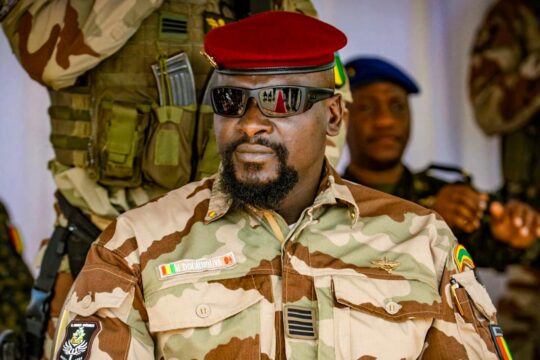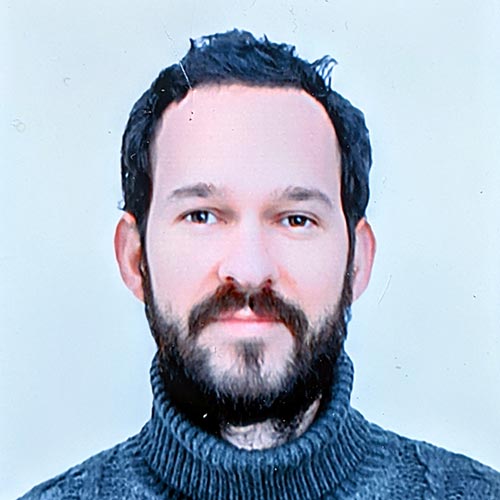Ansoumane Camara, nicknamed "Baffoé", took the stand in a sleek suit with oversized gold buttons. He was the third witness to testify at the Dixinn Criminal Court on Wednesday 29 November. The general recounted that tragic day of 28 September 2009 with many details. On that day, he commanded the Mobile Intervention and Security Company (CMIS 1), a police unit specialising in maintaining law and order. "On the eve of 28 September, I was called by the Director General of the National Police, Valentin Haba,” said Bafoé. “He told me that the demonstration [organised by the opposition] was banned and that I had to deploy my men from the cimenterie [a district in the suburbs of Conakry] to the vicinity of the stadium."
Around the stadium, the security deployment included Mamba armoured personnel carriers designed to control all the streets leading to the stadium. Security of the esplanade and the stadium was entrusted to the gendarmerie. "So the police had nothing to do with the stadium facilities, or even the stadium esplanade,” Baffoé insisted. This division of tasks was decided after a meeting "held at the army headquarters".
Visibly at ease on the stand, the 57-year-old retired officer told how his men deployed at 4am. While on an inspection tour, he was contacted by the Director General of the National Police. "At around nine o'clock, I was supposed to be in Cosa (a district in the suburbs of Conakry, 11 km from the stadium), but I was called by the Director General. He said to me 'leave everything and come here. According to the information, it seems there are small gatherings taking place at the stadium, come and see!’”
Police outnumbered
On site, the crowd was growing ever denser. Among the demonstrators, there were a few unidentified citizens, but the majority were activists responding to the opposition call to demonstrate. The rally was meant to send a signal to the junta, whose leader Moussa Dadis Camara had left unclear whether he would run in the next presidential election. The opposition refused to accept the candidacy of the man who was already in charge of the transition.
The very "popular" head of the anti-drug unit, Moussa Tiégboro Camara, was sent there by the authorities to try to "sensitise" the protesters, Baffoé told the court. The authorities were clear: the demonstration had to be stopped. Tiegboro asked those he met to postpone the rally, but his words were not getting through. The crowd was now "compact" and "some threw stones". Tiegboro was taken out and the demonstrators dispersed. But the forces responsible for maintaining order were soon overwhelmed. The protesters flooded the esplanade in front of the stadium. The police retreated. "We all fled!” he told the court. "When it comes to maintaining order, when the crowd is compact, even if you have the means to clear it, you have to withdraw because if you use force, the strongest will trample the weakest, and that can lead to damage, injury, even death.”
So far precise about the facts and the sequence of events, Baffoé suddenly made a temporal ellipsis. After recounting the events of the morning, he moved on to the early afternoon: "At around 1pm, (...) Minister Tiegboro came to ask us to clear the road so that people could move around. We were in the process of clearing [the barricades set up by the demonstrators]. Our arrival on the stadium esplanade coincided with the arrival of the military. I saw two army vans. You know, President Dadis’s protection had two low Toyota vans, the agents sat back to back. I saw two of those, plus a command vehicle.”
"Deathly silence”
Baffoé's account then took the audience back to the beginning of the massacre. "I don't know who was in command," he told the court. He said he did not recognise any of the red berets he saw. "The agents came down and entered the stadium. In the meantime, I saw Commander Toumba [Dadis's bodyguard] arriving alone. I saw him coming, on foot, but in big strides to join the others who were already in the stadium. Warning shots were fired.”
Baffoé recounted how he and his men took refuge in the police station next to the stadium. "We were unarmed and felt in danger ourselves.” He felt that his mission was over: "Wherever the military show up, there are immediately weapons, and we are out of place". They stayed in the shelter "for a while", then left the police station. "I saw Commander Toumba come in with wounded leaders and take them away. I didn't know where he was taking them. It was here that I learned he was sending them to the clinic. He was really protecting them.” He then spotted Tiegboro, who he said was “with certain leaders, including the President of the Union of Democratic Forces of Guinea [Cellou Dalein Diallo]. They left and there was a deathly silence”. The soldiers left behind them wounded and dead people, Baffoé added.
The court president and the prosecutor took turns questioning the general. According to him, three of the accused were at the stadium: Toumba, Tiegboro and even Marcel Guilavogui. The last two have always denied they were in the stadium. According to Baffoé, the three arrived after the red berets of the presidential guard who, according to Baffoé, were responsible for the massacre.
Risk of witnesses changing story
The prosecutor challenged him on part of his story: "I'm going to go back to your transcript, where you made statements other than those you have just made." Baffoé had told the investigating magistrate that Toumba was leading a group of soldiers. "Is this a variation, or do you maintain this statement to say that he came with his group?” Baffoé asserted that an error had crept into the transcript, and that what he was saying had been misunderstood. "You know, in French, there are different ways of speaking". He maintained that Toumba had arrived alone.
Not convinced, the president warned him against giving false testimony. "Still in your statement to the examining magistrate, you say: 'In this group of soldiers, I saw Toumba and his deputy Marcel. The young soldiers who were with them are unknown to me.’ You see what that means, it's the same thing as what the prosecutor has just said. You say that we haven't written down the sense in which you used it, but it's clear."
Baffoé is the first senior member of the security forces to be heard as an eyewitness to the stadium massacre. However, he played down the significance of his account: "I'm not the only witness, there were more important witnesses than me. I was just a simple commander.”
Does Baffoé’s hearing illustrate the risk of witnesses changing their story in a context where one of the accused, Claude Pivi, is still on the run after being freed from jail on November 4 by an armed commando? Some witnesses may choose to voluntarily soften their statements so as not to expose themselves to reprisals, concedes Maître Amadou DS Bah, coordinator of the victims' lawyers' collective. The fact is that so far, the first three witnesses have gone easy on the defendants. None of them were directly implicated.


